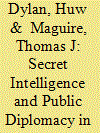| Srl | Item |
| 1 |
ID:
140493


|
|
|
|
|
| Summary/Abstract |
This article applies the concepts of ‘transnationalism’ and ‘state-private networks’ to early Cold War Britain to analyze the aims and methods of governmental and non-governmental counter-subversion and propaganda in the ‘Cultural Cold War’. Using recently declassified and underutilized files, the article explores the roles of the Official Committee on Communism (Home) and, more particularly, the Foreign Office Information Research Department. The Attlee and Churchill administrations of the late 1940s and early 1950s increasingly perceived the primary non-military threat of communism to Britain as part of Soviet-inspired transnational subversion of western European societies. This created a growing impetus for a symmetrical, transnational response through both domestic and foreign clandestine ‘indoctrination’ campaigns operating via influential non-state British institutions. Despite constitutional concerns still relevant today, in 1951 ministers endorsed the domestic component of this response as a fully-fledged strategy that would encourage greater state intervention in British society in the Cold War struggle for both liberty and security.
|
|
|
|
|
|
|
|
|
|
|
|
|
|
|
|
| 2 |
ID:
186365


|
|
|
|
|
| Summary/Abstract |
Intelligence is generally collected and used in secret to inform internal audiences. Before and after Russia’s invasion of Ukraine, however, the UK and US governments have deployed intelligence extensively to influence external audiences, both publicly and privately, regarding Russian intentions, capabilities and practices, and the consequences of Russian actions. While the scale, manner and initially pre-emptive nature of these disclosures represent a significant evolutionary step in how liberal-democratic governments use their intelligence assets, current practice has built upon historical precedents. This article examines why states choose to use intelligence – including fabricated intelligence – for influencing external audiences; the different methods they deploy for doing so; the gains and costs of publicising intelligence; and how the use of intelligence during the Russia–Ukraine conflict should be understood within broader historical and contemporary trends. The authors conclude that while liberal democracies’ use of intelligence in public is to be welcomed for its greater transparency, careful risk management will be needed if this approach is to continue.
|
|
|
|
|
|
|
|
|
|
|
|
|
|
|
|